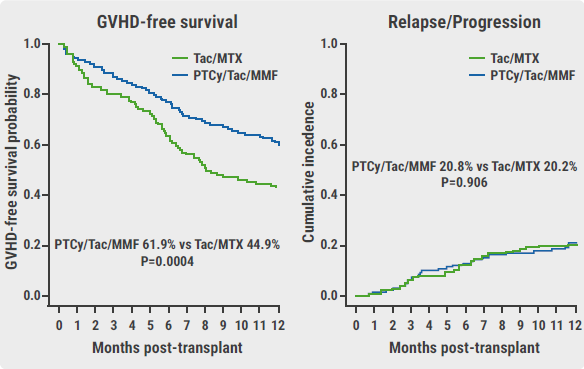https://doi.org/10.55788/3ca81939
Elranatamab is a humanised, bispecific antibody targeting BCMA-expressing MM cells and CD3-expressing T cells [1]. The MagnetisMM-3 study (NCT04649359) tested this agent in 187 patients with relapsed/refractory MM across 2 cohorts [2]. Prof. Nizar Bahlis (University of Calgary, Canada) presented the results of cohort A, including a patient population that had no prior exposure to BCMA-directed therapy (n=123). Notably, 96.7% of the participants were triple-class refractory at baseline. After 2 step-up doses of 12 mg and 32 mg respectively, the participants received 76 mg elranatamab once weekly, subcutaneously administered. The primary endpoint was the objective response rate (ORR) per blinded independent central review.
The confirmed ORR was 61.0%. In addition, 55.3% of the participants had at least a very good partial response and 27.6% had a complete or stringent complete response. Moreover, among participants who reached an objective response, the median time to response was 1.2 months. The median progression-free survival and overall survival had not been reached after 10.4 months of follow-up.
According to Prof. Bahlis, the safety profile of elranatamab was manageable. Haematologic events were the most common grade 3 or 4 treatment-emergent adverse events: anaemia (36.6%), neutropenia (48.0%), thrombocytopenia (22.0%), and lymphopenia (24.4%). Furthermore, cytokine release syndrome (CRS) occurred in 57.7% of the participants, with all of these events being of grade 1 or 2 severity. Prof. Bahlis added that the step-up priming regimen that was applied in this study mitigated the rate and severity of CRS. Finally, infections were seen in 66.7% of the participants, 35.0% being grade 3 or 4 infections.
So, in the phase 2 MagnetisMM-3 trial, elranatamab was well tolerated and efficacious in patients with relapsed/refractory MM, supporting the further investigation of this agent as monotherapy or in combination with other agents. The phase 3 MagnetisMM-5 trial (NCT05020236) evaluates elranatamab in relapsed/refractory MM and the phase 3 MagnetisMM-7 study (NCT05317416) tests elranatamab in patients with newly diagnosed MM as a post-transplant maintenance therapy.
- Shah N, et al. Leukemia. 2020;34:985–1005.
- Bahlis N, et al. Efficacy and Safety of Elranatamab in Patients with Relapsed/Refractory Multiple Myeloma Naïve to B-Cell Maturation Antigen (BCMA)-Directed Therapies: Results from Cohort a of the Magnetismm-3 Study. Abstract 159, ASH 64th Annual Meeting, 10–13 December 2022, New Orleans, LA, USA.
Copyright ©2023 Medicom Medical Publishers
Posted on
Previous Article
« Deep and durable responses for quadruple therapy in smouldering MM Next Article
Talquetamab further investigated in heavily pre-treated MM after promising phase 2 data »
« Deep and durable responses for quadruple therapy in smouldering MM Next Article
Talquetamab further investigated in heavily pre-treated MM after promising phase 2 data »
Table of Contents: ASH 2022
Featured articles
Acute Lymphoblastic Leukaemia
Blinatumomab candidate for standard-of-care in newly diagnosed B-ALL
High-dose methotrexate or standard interim maintenance in young patients with ALL?
Acute Myeloid Leukaemia
Excellent results for triplet regimen in FLT3-mutated AML
MRD by qPCR prognostic of outcomes in venetoclax-treated NPM1-mutated AML
Promising results for triplet therapy with magrolimab in AML
Should we use intensive chemotherapy prior to allo-HCT in relapsed/refractory AML?
Chronic Leukaemia
Zanubrutinib wins battle of BTK inhibitors in relapsed or refractory CLL/SLL
Ibrutinib plus venetoclax displays long-term benefits in CLL
Multiple Myeloma
Talquetamab further investigated in heavily pre-treated MM after promising phase 2 data
Promising results of elranatamab for MM in phase 2 MagnetisMM-3 trial
Deep and durable responses for quadruple therapy in smouldering MM
Ultra-sensitive MRD assessment in MM with BloodFlow
CAR-Hematotox score proves useful in relapsed/refractory MM
Head-to-head: VMP versus Rd in transplant-ineligible MM
Lymphoma
Ibrutinib added to ASCT improves clinical outcomes in mantle cell lymphoma
High-dose chemotherapy plus ASCT superior to standard immuno-chemotherapy in primary CNS lymphoma
Odronextamab has considerable anti-tumour effects in relapsed/refractory diffuse large B-cell lymphoma and follicular lymphoma
Excellent results for AFM13-complexed NK cells in CD30-positive lymphoma
CAR-Hematotox score predicts toxicity, infections, and clinical outcomes in MCL
Myeloproliferative Neoplasms
Efgartigimod successful in immune thrombocytopenia
INCA033989: novel investigational agent for CALR-mutated MPN
Ruxolitinib mediates clonal evolution of RAS pathway mutations in MPN
Immune Thrombocytopenia
Long-term risk for haematologic disease in persistent, isolated mild thrombocytopenia
Various Topics
C1 inhibitor deficiency linked to thrombosis
Durable responses to gene therapy in haemophilia A
Long-term benefits from beti-cel in transfusion-dependent β-thalassaemia
Neutrodiet: non-restricted diet is the preferred option after SCT
Iptacopan offers solution for patients with PNH and residual anaemia after standard-of-care
Novel therapy may replace standard-of-care prophylaxis for GVHD
LMWH does not result in higher live birth rates in women with inherited thrombophilia
Related Articles

February 20, 2023
Novel therapy may replace standard-of-care prophylaxis for GVHD
February 20, 2023
C1 inhibitor deficiency linked to thrombosis
© 2024 Medicom Medical Publishers. All rights reserved. Terms and Conditions | Privacy Policy
HEAD OFFICE
Laarderhoogtweg 25
1101 EB Amsterdam
The Netherlands
T: +31 85 4012 560
E: publishers@medicom-publishers.com

